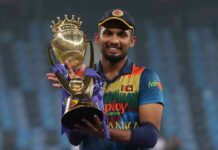Sri Lanka lead the three-Test series 1-0 against Pakistan and have an 87-run first-innings lead in the third Test. On day four, Sri Lanka adopt an overly cautious approach as they stumble along at 2.1 runs per over in their second innings and are wiped out the next day, shortly before lunch.
Pakistan chase down 302 in just two sessions to pull off a thrilling five-wicket win – one of their finest Test successes under Misbah-ul-Haq. Angelo Mathews, in his first major assignment as Test captain (a series against Bangladesh had already been won), faces the ire of distraught fans and is labelled the victim of a negative mindset.
Galle, August 2014: Same protagonists. The fourth day of the first Test begins with a draw looking imminent. Sri Lanka declare shortly before stumps with an 82-run first-innings lead on the back of Kumar Sangakkara’s 10th double ton. In their second innings, Pakistan’s batsmen pull the shutters down, allowing Rangana Herath to scalp six wickets on a day-five pitch that hardly assists his left-arm spin. Sri Lanka have 21 overs to get 99 runs, with fading light and fast-approaching rain threatening to throw a spanner in the works. Two down within 12 overs, the pressure gets to even Sangakkara, who plays an awful stroke to be caught in the outfield. Mathews hits a couple of fours and sixes to seal the dramatic chase with a seven-wicket win.
Within seven months, Mathews has turned the corner as captain. Or has he? Perhaps too early to tell. But he certainly has, as a batsman.
“Angelo has improved a lot as captain,” Sanath Jayasuriya, Sri Lanka’s chairman of selectors, tells Wisden India. “As a batsman also, he has been phenomenal over the year. Even as a team player, he’s doing exceptionally well with the ball. That’s really commendable.”
The adage ‘a captain is as good as his team’ can’t be better illustrated than by Mathews and Sri Lanka’s upward trend in the recent past. Under Mathews, Sri Lanka have won Test series against Bangladesh – both at home and away. While they drew the Test series against Pakistan in the United Arab Emirates, they lifted the Asia Cup in Bangladesh and also secured their first ever Test series victory in England. The Test series loss to South Africa, then the No. 2 side, coming on the back of the 1-2 defeat in the One-Day Internationals to the same side, both at home last month, have been the only blips thus far.
When he was handed the over the reins in February 2013, Mathews, then 25, was Sri Lanka’s youngest Test captain and had to lead a side featuring some of the biggest names in Sri Lankan cricket.
Jayasuriya admits one of the reasons for investing in Mathews is his temperament. He has often shown that he can remain unruffled in the face of rising pressure and can continue to play his normal game, guiding other players with a degree of maturity that belies his age.
“Angelo has had a great learning curve. He showed early promise when he started his career. He had experienced players like Sangakkara, (Mahela) Jayawardene, (Tillakaratne) Dilshan and others around to guide him,” says Jayasuriya.
For some, captaincy might be an albatross around their neck. Ask Alastair Cook. He thrived in his early period of leadership, but had to battle the demons in his head and critics alike for more than a year until finding some form in Southampton. Even Ricky Ponting towards the end of his captaincy stint found it difficult to concentrate on his game.
“Maybe the twin pressures of leading a team that wasn’t winning and scoring runs at No. 3 wore me down more than I was prepared to acknowledge at the time. Spending more than a day in the field and then, straightaway, padding up and going out to bat never got easier, but I didn’t want to move down the order. Not while I was captain.” Ponting wrote in his book, At the Close of Play. This, coming from one of the most successful captains in the game, offers great insight into the pressures on an international captain.
But Mathews seems to be soaring like an eagle despite the additional responsibilities. His batting while leading the side has symbolised the change in his approach. Benefiting from Sri Lanka’s busy Test schedule, Mathews has gone from being an inconsistent player averaging 39.71 with just one century in 31 Tests, to someone who is capable of consistently stacking up runs and even sealing wins for his side.
In his first Test appearance at Lord’s, Mathews scored a brilliant century in the first Test against England in June. At Headingley, in the second Test, his all-round performance as captain put him in an elite list of captain-allrounders who have scored a century and also picked up a four-wicket haul in the same Test. Since his elevation to captaincy, Mathews has held his own with the bat despite the presence of the venerable duo of Sangakkara and Jayawardene.
Mathews’s recent scores leading up to the unbeaten 25 in the second innings against Pakistan in the first Test are 91, 157 not out, 42, 91, 31, 86, 5, 43 not out, 102, 18, 26, 160, 89, 27, 63, 63 not out and 91. With the bat, he averages close to 87 as captain. A qualifying mark of 20 Test innings as captain was set to ensure a statistically valid number and basis of comparison, resulting in Mathews keeping company with an illustrious group.
“A captain is held responsible when things go wrong; and any rottenness in him spreads through the whole organism. Moreover he tends to feel responsible when the side does badly. He may of course be right. But there also may be nothing more that he could have done,” wrote Mike Brearley in his highly acclaimed book, The Art of Captaincy.
At 27, Mathews is still in the nascent stages of his captaincy stint, has the experience of Sangakkara and Jayawardene – for one more Test – to fall back on, and is yet to encounter troughs like his Indian and English counterparts have. But right now, his dream run, coupled with Sri Lanka’s surge, have triggered massive expectations and the question of what heights he will achieve as a leader. Handling pressure is the key to captaincy and batting – in Mathews’s case, even bowling — and whether he continues to do so with the same aplomb will determine what legacy he leaves behind as a leader.
Post the Jayawardene-Sangakkara era, Mathews will have a mountain to climb, moulding a side in transition. But Jayasuriya is confident of Mathews’s abilities. “He’s mature enough to lead the side, with or without the seniors around him,” says Jayasuriya.
On his part, Mathews has chosen to look at the resources available to him rather than lament what he doesn’t have. “We don’t have (Chaminda) Vaas or Murali (Muttiah Muralitharan) in the team, but we have guys who are willing to do the job, work hard and are excited about playing Test cricket,” Mathews had said after the series victory in England.
There definitely is more merit in keeping things simple by creating an atmosphere for players to flourish and allowing success to come to you, rather than chasing it. At the moment, it is success that seems to be chasing Angelo Mathews, and mere luck has little to do with it.
























